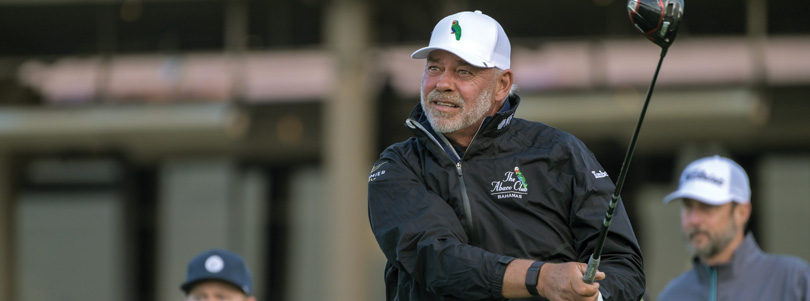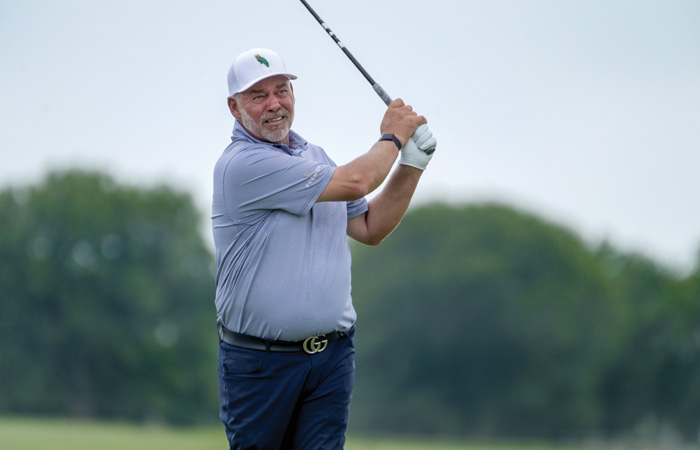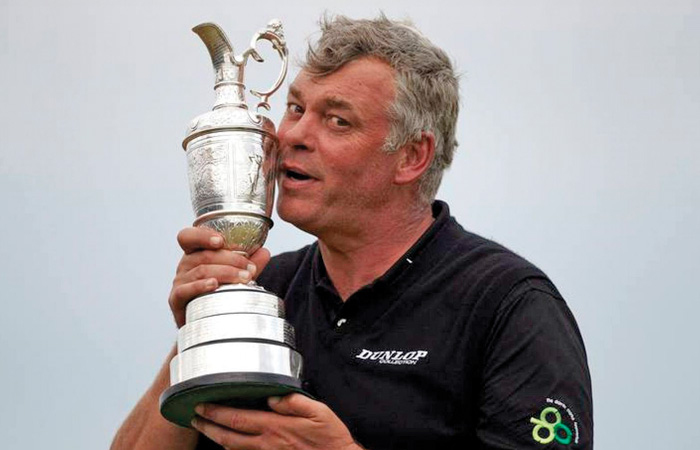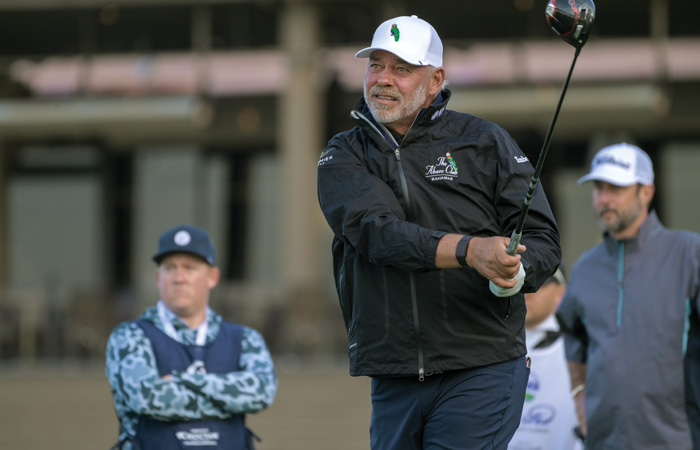Feature Story – Darren Clarke

Darren Clarke had to make a decision as a teenager that would shape his life. He was infatuated with rugby and felt like he could have a future in the sport. But he was also a talented junior golfer, making a name for himself in his native Northern Ireland and in Ireland.
He opted for pitches and putts over scrums and tackles. It’s safe to say, he made the right call. You don’t hear about many rugby players still competing at 55 and making a good living doing it.
Clarke, who won three times on the PGA TOUR, has made $8.6 million in official money. He has won four times (so far) on PGA TOUR Champions and earned $4.8 million.

Another good decision was to heed a bomb threat in his third week on the job at a bar in his hometown of Dungannon, Northern Ireland, in 1986. As he told reporters before the British Open at Royal Portrush in 2019, the bar was leveled by a blast.
The following year, he attended Wake Forest, which was coming off an NCAA championship. He didn’t see action in the fall and by the spring semester he was back in Ireland.
That decision turned out OK as well. He turned pro and eventually began playing on what is now the DP World Tour.
In addition to winning the 2011 British Open, Clarke defeated Tiger Woods 4 and 3 in the final of the 2000 WGC-Andersen Consulting Match Play Championship, and he won the 2003 WGC NEC Invitational at Firestone.
He has been involved in eight Ryder Cups as a player, vice captain and captain. He is 10-7-3 in five Ryder Cups with four team victories. He was 3-0-0 in 2006, his final Ryder Cup as a player. It was an emotional week for him and his teammates. His wife, Heather, died from breast cancer six weeks before the matches. She made him promise that he would play at the K Club in Ireland if he was selected.
He told the Irish Post last year, “After 2006 and that Ryder Cup, coming down the stretch in the major was a walk in the park. 2006 was the hardest I’ve had to do.”
Clarke, known for having a good time, was famously still under the influence from a night celebrating his 2011 British Open victory when he arrived at the news conference the following morning at Royal St. George’s.
One of his proudest moments as a golfer came in 2022, he won the Senior Open Championship by one shot over Irishman Padraig Harrington at Gleneagles in Scotland. Gary Player, Bob Charles and Tom Watson are the only other players to win the British Open and the Senior British Open.
When he’s not on the senior tour, Clarke lives at the Abaco Club on Winding Bay in the Bahamas, which hosted a Korn Ferry Tour event in January. His love of golf may be matched by his passion for fishing the shallow Caribbean waters for permit, a deep-bodied, silvery fish. He stands on the bow of a skiff using a fly rod and reel. Casting to a precise spot 30-40 feet away to where the permit are feeding is not unlike delicate chip shots around the green.
Clarke, gregarious and bronze from the sun, serves as the ambassador for the Abaco Club. He was visiting Bluejack National near Montgomery recently when he sat down with AvidGolfer.
AVIDGOLFER: What brought you more satisfaction, five Ryder Cups or the one major?
CLARKE: (pause) Hmmm, playing five, vice captain twice, captain once in the Ryder Cup. The Ryder Cup is a huge, huge honor. It’s not like anything else we do in sport.
I guess winning the Open championship, the one I always wanted to win as a young kid. I was down on the putting green, and I would be over there, “This is a 6-footer for the Open.” The Open was always the one that I wanted to win. That was very special.

And then when I turned 50, the one that I wanted to win more than any other one was the Senior British Open, because there had only been three people in history that’s done it before, winning the Open and the Senior British. And I was able to accomplish that a couple of years ago as well. The game has been good to me and I’ve been very, very fortunate.
AG: What would your No. 1 piece of advice be to a professional golfer coming up in the ranks in 2024?
DC: A hundred yards and in. Work, work, work.
The game has changed a lot. A lot of sports have evolved. Look at these young kids with 180 miles per hour-plus ball speed. It’s all well and good. It’s wonderful to hit the ball as far as you can, but unless you have a very good wedge game, that ain’t going to do you any good. A lot of the young kids I see get obsessed with hitting the ball as far as they can, which is great, but unless they’re spending more time on 100 yards and in with wedge distance control, chipping and putting, they’re not going to be on tour for too long.
No matter how far technology advances, you’re still going to have to hole a 5-footer, downhill, left to right and greens running about 12, 13 on the Stimpmeter. And that takes a lot of nerve, and that takes a lot of practice.
AG: You won the 2000 WGC Match Play beating Tiger 4 and 3, the British Open, then the Senior British Open where you beat Padraig Harrington by one. How would you rank those three?
DC: I also won the WGC at Firestone with Tiger (in 2003) down the stretch. The game has been very good to me. If I had been maybe a fraction more dedicated – don’t get me wrong, I worked my ass off – but if I had been a little bit more dedicated and not quite enjoyed myself, then maybe I would have won more. But it has been an unbelievable journey all along the way. Like everybody in life, I’ve had my ups and I’ve had my downs. Some tough times and some great times. But right now, I’m 55 playing the Champions Tour, contending – would like to be contending a lot more and winning out there.
I’m living at the Abaco Club in Winding Bay. That’s home for us now. I’m in and out of there all the time. I come and play three weeks, go the Bahamas for two weeks, come and play three weeks, go to the Bahamas for two weeks. Where’d it all go wrong? (Smiling broadly.)
AG: Why the Bahamas?
DC: Back in the late 90s and 2000s, I was playing a lot of PGA TOUR and European Tour, and I was looking for a base in America. And we looked and looked, and I was very close to buying a property in Isleworth, Fla., back in those days. And I didn’t quite pull the trigger on it.
And I thought, you know, if I want to go out and go to a restaurant or go to a bar, I don’t really want to see the guys that I’m seeing every week whenever I’m playing on tour, because I don’t want them saying, “Ah, I saw you in there falling off a chair or doing whatever, drinking too much.” So we decided to look elsewhere.
I ran into an old friend, developer Peter De Savary. He said you’ve got to come down and take a look at our place in the Bahamas. We bought our property in March 2005. I love the place. It’s incredible. It’s everything I want. I’m a big saltwater fly guy. It’s the best golf course in the Bahamas, top three in the Caribbean, the practice facilities are second to none. It’s got one of the best saltwater flyfish lodges. So it ticked all my boxes.
It truly is a very special place. I’m lucky that I’m the ambassador for the club, but I was a member long before I was the ambassador for the club. The first day you leave there is the first day you can’t wait to get back. And that’s the truth. That’s not a PR spiel. Every time I get back down there again, I’m just so excited to get back.
If I’m not fishing, if I’m not out on the flats hunting permit, then I’m on the range. On the back of the range, I have my own little tee and I’m down there working on my game, chipping and putting. I go to Flippers Beach Bar about 4:30. There’s some sticky stuff on the seats there that I can’t get my butt off of. Unfortunately, I end up going to bed rather early and maybe slightly intoxicated. And then get up and repeat the next day again.
AG: What is your drink of choice these days?
DC: The club wanted to name a drink after me. I used to drink a sea breeze – vodka, cranberry and grapefruit juice, if it’s not a light beer (tapping his trim tummy) or whatever. I’m doing OK weight-wise at the moment, but I drink what they call a DC breeze – my initials. It’s vodka, cranberry, grapefruit, and they get some of the fresh coconuts and chop the top off and put fresh coconut water in there. Everybody thinks it’s healthy (lowering his voice as if revealing a secret), but there’s still the same amount of vodka in there. So the end result is still the same.

AG: When did you become a saltwater fisherman?
DC: I started fishing when I was a young kid. I got more into fly fishing when I was about 20 or so. I used to fish for trout and salmon. Whenever we bought our property, I got into the Bahamas, got into salt, and that was it. All my freshwater rods and reels have never been touched since. It’s all salt. When you get into salt, you never go back. When you catch a trout in a stream, it’s got a little bit of run from bank to bank, but if you catch a fish in the ocean, they can run wherever. So they pull much harder. The tug is the drug.
AG: Going back to your early days, is it accurate to say you spent a semester at Wake Forest?
DC: A semester and a half. Coach (Jesse Haddock) and I didn’t see eye to eye. We had a little bit of a discussion that turned into a debate, turned into a little bit more of a heated debate and I left the next day.
I came home. It was a golden opportunity, obviously, to go to university over here, especially somewhere the quality of Wake Forest. It just didn’t quite work out. My parents were a little bit annoyed with me.
AG: If you hadn’t done golf, what would you have done?
DC: I had my choice when I was about 17. I had to make my mind up. Was I going to be a golfer or a rugby player. Rugby was my big thing. I was never cut out for the sitting in the office sort of guy. That wasn’t my thing. The other thing I had was a need for speed. I was that guy growing up that had all the toys. When I started making a little bit of cash on tour, I had all the Ferraris and all that sort of stuff.
If I hadn’t been a golfer, I’d probably have been a rugby player.
AG: Did LIV Golf ever make an offer?
DC: LIV offered me not a role in playing. They offered me a substantial amount of money to do commentary. Three years for four tournaments a year. I pushed it up the PGA Tour chain to see if I could do it. The response was “No, if you were to do that Darren, you would be under the same sanctions as all the rest of the players.”
I thought I could do both because it was only commentating. You think about it, the rules are the rules and what have you. I chose not to because if I did that then my playing days were over. That was just before the season that I won the Senior British. As I said, that was one of my big goals. They made me a very, very generous offer, and I didn’t do it.
In terms of those guys that all went to LIV, respect to them. It’s very hard to turn down that amount of cash. I have a lot of friends that went and did it. I just wish there would be some form of resolution some way or another because I think the fans want to see all the best players in the world playing together, competing more regularly against each other. I hope some resolution does happen at some stage.
AG: What would you have done if you had been 10 years younger and they had made an offer?
DC: That’s a very good question, and I can’t answer that. Unlike a couple of my friends who were very close to 50 that went and joined, 10 years ago I would have been 44, 45 maybe thinking I could still win a few more. I don’t know. I really don’t. Part of me would say no. Part of me would say yes. I can’t honestly give you a straight yes or no to that question.
AG: What are your thoughts on PGA Frisco, last year’s host for the Senior PGA Championship where you tied for fifth?
DC: I think from the fairway into the greens it was really good. I’m not a huge fan of the teeing grounds being led into the fairways. Gil Hanse likes that sort of stuff, like that’s what it used to be. That’s not what it used to be. Look at St. Andrews. That’s not quite that way.
I enjoyed the golf course. I thought it was a good challenge. It was hard, but it was fair.
Why anybody would want to go and walk seven-and-a-half thousand yards is a bit beyond me in this modern day and age. We’re all into making the golf course great and enjoyable. If people want to walk, let them walk, but don’t take away the option of riding in a cart. You’re taking away the option for some people that may want to play the golf course that are not physically able to walk the golf course. But I enjoyed it.



